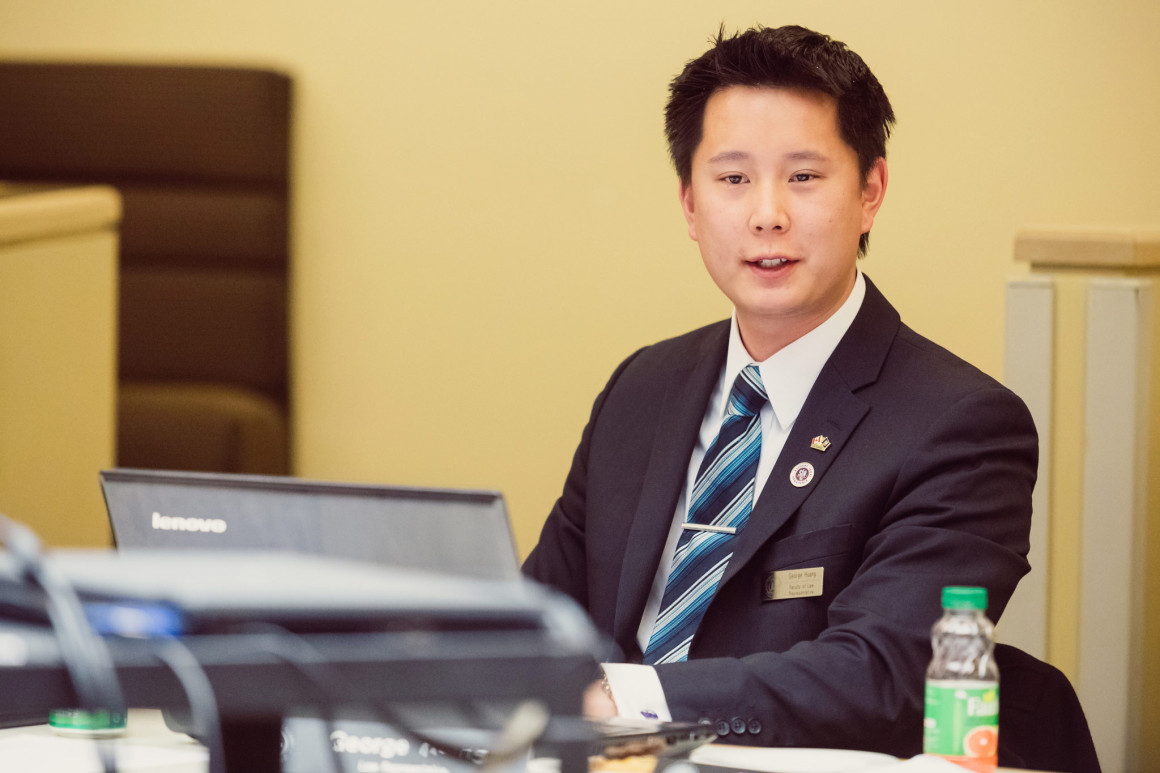
Faculty of law up for tuition hike of $250 per course
By Chris Adams, September 18 2014 —
Faculty of law dean Ian Holloway revealed at a town hall Wednesday, Sept. 17, that his faculty will propose a $250 per course tuition increase when market modifier applications are due this October.
This would increase tuition to $16,100 for first-year law students. Second and third-year tuition will increase to $14,000 with the $250 per course hike.
Holloway’s presentation revealed that revenue from the market modifier will total $700,000 if approved. Thirty per cent of that amount will go to the university administration.
Law students currently pay around $13,100 in tuition per year.
The University of Alberta is also looking to raise tuition in their faculty of law from $10,121 to $15,995. However, U of A administration will only receive 20 per cent of revenue from the modifier.
SU law representative George Huang said he doesn’t want any one faculty to be the U of C’s piggy bank.
“If we’re paying tuition, generally we like to keep as much for ourselves,” Huang said. “But we do understand there are administrative costs.”
Holloway said $300,000 from the modifier will go to scholarships and bursaries, $150,000 to debt relief and $230,000 to hire three new staff members.
The Society of Law Students will be hosting a second town hall on Thursday Sept. 25. The SLS wants a sense of how law students feel about the modifier before moving forward with consultation.
Holloway has said that if the SLS isn’t on board with the fee, he won’t submit the proposal.
Students’ Union vice-president external Levi Nilson said even if money goes toward scholarships and bursaries, students will still shy away from higher tuition costs.
“You will be shutting people out, plain and simple. You might make more opportunities and resources available. At the end of the day, raising tuition is not going to increase access,” Nilson said.
The Schulich School of Engineering and the Haskayne School of Business’s masters of business administration haven’t publicly released how much they are applying for.
Former minister of advanced education Dave Hancock sent out the call for post-secondary institutions to apply for tuition increases known as market modifiers this summer. Media learned about the government’s plans when student advocacy group Council for Alberta University Students made proposal draft documents public on August 21.
Market modifiers are increases in tuition for faculties with a perceived higher earning potential. Proposals have to show how a modifier will improve student experience, education and compare program tuition with other universities.
Provost and vice-president academic Dru Marshall revealed the three faculties’ to propose market modifiers at Students’ Legislative Council on Sept. 9. Leaders from the faculties were in attendance and asked Marshall questions on where the money will be spent, how much students will be charged and how they’ll be consulted before a modifier is applied.
When the Alberta government accepted market modifier proposals in 2010, they said it was a one-time tuition correction.
Student groups quickly reacted to last week’s news that these faculties are up for tuition increases this fall.
Engineering Students’ Society president Christine Ochitwa was surprised by the ministry’s decision to accept proposals again.
“My personal feeling through this whole process was that last time market modifiers happened, it was supposed to be a one-time tuition correction. That’s something that was said over and over again in the news,” Ochitwa said. “It seems like they’re trying to make the exception the norm.”
An ESS survey published in 2010 questioned engineering students about market modifiers. Marshall questioned the survey’s wording.
Ochitwa said the survey lifted information from the U of C’s frequently asked questions page about market modifiers. Ninety-five per cent of students said they weren’t in favour of a modifier.
ESS will conduct a new survey on market modifiers once they know how much the Schulich School of Engineering is planning to increase fees. Ochitwa said they will send out information to students and host town-hall meetings to get student feedback on market modifiers.
Marshall said the deans of the faculties will handle student consultation. Ochitwa has been meeting with the dean of engineering, although proposal specifics are still unknown.
“Our big take away is we definitely want to see some metrics. If a market modifier would go through, how would the faculty be held accountable for that money?” Ochitwa said.
Politicians and organizations outside the U of C have questioned the use of market modifiers. Liberal MLA Kent Hehr said the provincial government shouldn’t allow market modifiers in Alberta. He said Alberta’s already low university attendance rates won’t increase if students are charged more.
Final decisions will be made by the province in November.
